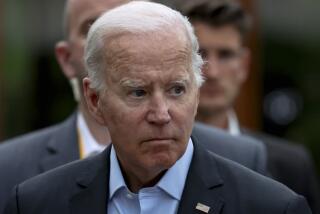WASHINGTON INSIGHT
“V” FOR VETO: The White House is loading its guns for a barrage of new presidential vetoes this summer and autumn as part of President Bush’s new resolve to present a “tough-guy” image to voters in advance of the 1992 election campaign.
Aides say the President’s threats last week to veto the civil rights bill and a separate measure allowing regional “Baby Bell” telephone companies to manufacture communications equipment were just the beginning. Bush also is expected to nix--or threaten to reject--a spate of other major bills, from abortion to campaign financing. “Almost anything you can mention” will be veto bait, a Congress-watcher says.
Strategists say Bush has two immediate objectives: First, to counter the widely held perception that although he has shown himself to be decisive on foreign-affairs issues--such as the war in the Persian Gulf--he is ineffectual at home. Second, to heighten the GOP’s image as a guardian of mainstream values, in the process painting the Democrats as radicals--just as the 1992 campaign gets under way.
THE HUNT FOR “OCTOBER SURPRISE”: Hopes by Democratic congressional leaders that they may be able to reap political gains from the so-called “October surprise” charges appear to be fading--and rapidly, congressional sources say.
Democratic leaders thought they might have had something when Gary Sick, a former Jimmy Carter Administration national security expert, raised the possibility that Ronald Reagan’s aides might have bargained with Iranian officials to hold up any release of U.S. hostages until after the 1980 election. At the request of House leaders, a special task force--comprising senior staff investigators from several key House committees--has been probing the charges for weeks. The group is slated to issue a report later this month.
But insiders say that despite weeks of intense investigation, the staffers still have not found a “smoking gun”--hard evidence that would substantiate Sick’s charges--and Democratic leaders are loath to proceed with a more-public inquiry unless they are convinced they can make the allegations stick.
NO INTEREST? The Bush Administration’s yearlong campaign to prod the Federal Reserve Board into nudging interest rates lower has been abruptly squelched--at the highest levels.
Although senior Administration officials were publicly berating the Fed as late as a few weeks ago, insiders say the President himself has stepped in to put a damper on the effort. Bush reportedly ordered Treasury Secretary Nicholas F. Brady, an outspoken proponent of lowering interest rates, to stop bashing the Fed. Brady barely even raised the issue at last week’s annual ministerial-level meeting in Paris of the 24 largest industrial nations. And White House economist Michael J. Boskin is publicly praising the Fed to anyone who asks.
The White House is worried that although short-term interest rates--which are heavily influenced by the Fed--have been declining, long-term rates are on the upswing, partly because financial markets fear the Fed may someday have to yield to Administration pressures. Also, despite the Administration’s previous carping, the recession appears to be coming to an end, and the rate cuts may not be needed.
Fed Chairman Alan Greenspan said this past week the downturn has ended and the recovery appears to be under way.
More to Read
Get the L.A. Times Politics newsletter
Deeply reported insights into legislation, politics and policy from Sacramento, Washington and beyond. In your inbox three times per week.
You may occasionally receive promotional content from the Los Angeles Times.










